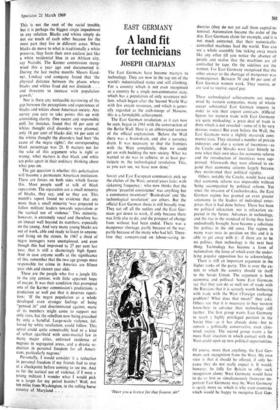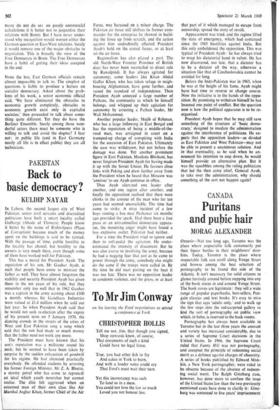A land fit for technicians
EAST GERMANY JOSEPH CHAPMAN
The East Germans have become martyrs to technology. They are now in the top ten of the world's industrialised states and still climbing. For a country which is not even recognised as a country by a single non-communist state, which has a population of only seventeen mil- lion, which began after the Second World War with few extant resources, and which is gener- ally regarded as the arch-stooge of Moscow, this is a formidable achievement.
The East German revolution, as it can now be seen, began in 1961 with the construction of the Berlin Wall. Here is an abbreviated version of the official explanation. 'Before the Wall there was a brain-drain, and also a currency drain. It was necessary to shut the frontiers with the West completely, then we could get on with building the new society. What we wanted to do was to achieve, or at least par- ticipate in. the technological revolution. This, as you can see, we have now done.'
Soviet and East European communists pick up the cliches of the West, several years later, with sickening frequency : who now thinks that the phrase 'peaceful coexistence' was anything but a communist invention? 'Brain-drain' and 'the technological revolution' are others. But the official East German thesis is still broadly true. They cut off all the outlets and the East Ger- mans got down to work, if only because there was little else to do, and the prospect of change from without had been ended. There was a manpower shortage, partly because of the war, partly because of the many who had left. There- fore they concentrated on labour-saving in- 'Have you a licence for that firearm, sir?'
dustries (they do not yet call them capital-in- tensive). Automation became the order of the day. East Germans claim for example, and it is not much contested, that their numerically- controlled machines lead the world. You can see a whole assembly line ticking away much like any other till you notice the absence of people and realise that the machines are all controlled by tape. On the sidelines are the women. For East Germany recognised that the other answer to the shortage of manpower was womanpower. Between 70 and 80 per cent of East German women work. They receive, or are said to receive, equal pay.
These technological achievements are recog- nised by western companies, many of whom accept substantial East German imports in order to win their export contracts. (Official figures for western trade with East Germany are quite misleading; a great deal of trade is done which is not revealed—some of it by very devious routes.) But even before the Wall, the East Germans were a slightly maverick com- munist state. They retained a number of private industries and also a system of incentives—as the Czechs and Slovaks were later bitterly to note when their own ideas for economic reform and the introduction of incentives were sup- pressed. Afterwards they were allowed to ex- pand their economic reforms largely because they maintained their political rigidity.
Others, notably the Czechs, would have said that economic reform was impossible without being accompanied by political reform. Yet since the invasion of Czechoslovakia, the East German regime has granted an even greater autonomy to the leaders of individual enter- prises than it had done before. There has been no political relaxation, nor is relaxation ex- pected in the future. Advances in technology, and the rise in the standard of living they have undoubtedly brought, have become a substitute for politics in the old sense. The regime in many ways rests its position on this and it is able to get away with it : if there are to be no politics, then technology is the next best thing. Technology has become a form of nationalism, the force of which even the under- lying popular opposition has to acknowledge.
There is still an important argument in the higher ranks of the party. This is over the ex- tent to which the country should tie itself to the Soviet Union. The argument is both economic and political. Some East Germans say that they can do so well out of trade with the Russians that it is scarcely worth bothering with trade with the West ('Foreign exchange problem? What does that mean?' they ask). Others say that it is necessary to buy western know-how to advance their technology still further. The first group wants East Germany to reach a highly privileged position in the Soviet bloc—as it has already done—but to remain a politically conservative, even clois- tered, society. The second group wants a far more fluid situation in which contact with the West could open up new political opportunities.
Of course, more than anything, the East Ger- mans seek recognition from the West. My own view is that it should be offered, if only be- cause they do not really expect it. It would, however, be folly for Britain to offer such recognition alone; West Germany would have to do so first or simultaneously (however im- portant East Germany may be, West Germany is surely more so, which is why even countries which would be happy to recognise East Ger-
many do not do so: on purely commercial calculations it is better not to jeopardise their relations with Bonn). But I have never under- stood why recognition would worsen either the German question or East-West relations. Surely it would remove one of the major obstacles to negotiation. This is broadly the view of the Free Democrats in Bonn. The Free Democrats have a habit of getting their ideas accepted in the end.
None the less, East German officials remain almost impossible to talk to. The simplest of questions is liable to produce a lecture on socialist democracy. Asked about the prob- lems of his work, a senior economic official said, 'We have eliminated the obstacles to economic growth completely, obstacles to economic growth exist only in capitalist societies,' then proceeded to talk about some- thing quite different. Yet they do have the Berliner Ensemble. Surely among those won- derful actors there must be someone who is willing to talk and avoid the dogma? I fear not: in public life (and in East Germany nearly all life is in effect public) they are all technicians.











































 Previous page
Previous page